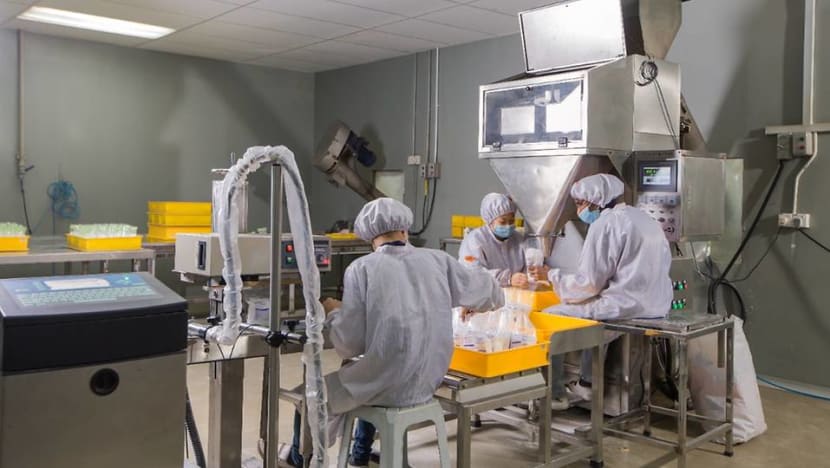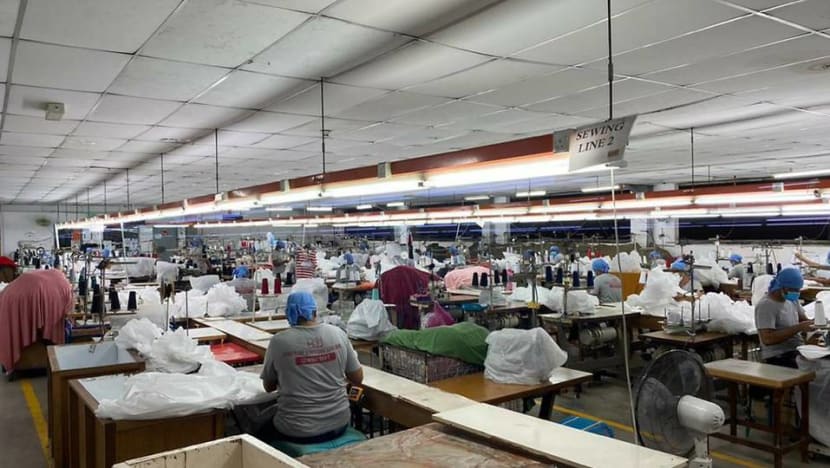Malaysia manufacturers reduce output as COVID-19 lockdown limits workforce capacity to 60%

A view of a deserted bridge during a lockdown in Kuala Lumpur, Malaysia on Jun 1, 2021. (Photo: Reuters/Lim Huey Teng)
KUALA LUMPUR: Since the start of Malaysia’s total lockdown on Tuesday (Jun 1), a salt manufacturer in Selangor has cut its production line from over 18 types of products to a maximum of 10.
Mr Seow Jun Ze, the business development manager of Qingli Sdn Bhd, said the company decided to focus on faster moving items that have higher consumer demand.
“We’re down at least 38 to 40 per cent from normal production, and even for the 10 product lines, the required lead time for orders is much longer now,” he said.

The salt producer's situation is not unique, as manufacturers and employers across the country grapple with reduced outputs as a result of lower manpower mandated by COVID-19 restrictions.
The total lockdown was announced by the Prime Minister's Office on May 28 in light of surging COVID-19 case numbers and deaths. The next day, 9,020 new daily cases were reported, the highest daily toll since the start of the pandemic.
A 60 per cent limit on manpower capacity was announced as part of the standard operating procedures for permitted service and manufacturing sectors.
READ: Malaysia's glove industry is booming amid COVID-19, but are rubber smallholders seeing the benefits?
To comply with the operating manpower limit, Asia Brands Berhad, a fabric manufacturer as well as garment producer and retailer, has to rotate workers' shifts to ensure everyone gets a turn on the line.
Its chairman Tan Thian Poh said those in the administrative side work from home as much as possible.

“The manpower limit does cut into our production output, especially since we were facing labour shortages over two years back when the government cut foreign worker intake,” Mr Tan, who currently chairs the Federation of Malaysian Fashion, Textile and Apparel (FMFTA), said.
“The retail and consumer fashion units are not running right now per government orders, but we also manufacture non-woven fabric and personal protective equipment (PPE) and fabric masks,” he added.
STRICT COMPLIANCE
The manufacturers agreed that the workforce capacity limit was necessary to bring the cases down in the short term.
“I think manufacturers understand, and are willing to bite the bullet to help flatten the infection numbers’ curve as much as possible, so it’s okay if in the short term, you pay full wages even though the worker might only be working half the normal time,” FMFTA's Mr Tan said.
But if the lockdown dragged further, he said, business owners would have to prioritise their companies’ survival. Some might resort to letting go of employees who would be surplus to the manpower limit.
Mr Shamsuddin Bahardin, council secretary for the Malaysian Employers Federation (MEF), said an estimated 30 per cent of the trade organisation’s members were allowed to operate during the two-week lockdown.
He added that the organisation disseminates the government’s SOPs to their members, along with advice to strictly adhere to them.
READ: Malaysia warns of rising number of COVID-19 deaths, cases among children
"The advisories also warned member companies that failure to follow the SOPs would result in automatic stop-work orders and strict, unappealable penalties," he said.
The Federation of Malaysian Manufacturers does the same as well, its president Soh Thian Lai said.

“Employers are required to conduct stringent health checks on their employees before they enter the factory premise for work everyday including checking their MySejahtera (contact tracing app) risk status,” he said.
The trade organisations called for the government to provide assistance to companies not allowed to operate during the total lockdown.
Proposed assistance would have included an automatic loan moratorium for business loans, along with energy assistance for electrical and gas utilities during the total lockdown period, Mr Soh said.
Mr Shamsuddin listed wage subsidy, targeted credit facility for micro, small- and medium-size enterprises (SMEs) and moratorium on penalties to various government agencies as among measures that would ease some of the pressure on employers.

IMPETUS FOR AUTOMATION
The pandemic and the lockdowns are an “opportunity in a crisis” moment for both the private sector and government to reduce their dependence on unskilled foreign labour and shift to higher value, technology and knowledge-based production, said Sunway University Business School economist Yeah Kim Leng.
“While the pandemic is a push factor for industrialists to adopt labour-saving technologies, the government could accelerate this structural transformation with bigger ‘carrots’ like low-cost financing and support for research and development and technology adoption,” said.
READ: Constrained by fiscal space, experts say Malaysia's latest COVID-19 aid package too small to make an impact
For Mr Tan, the textile manufacturer, the benefits of automation are undeniable.
“Automation is the future, but it needs to be a holistic solution,” he said.
He said his company had already begun the transition process into automated manufacturing, but time and money are the constraints holding back other smaller ones.
The upfront costs for financing new, more advanced machines were prohibitive for manufacturers and companies without deep pockets, he added.
To help overcome the latter problem, Mr Tan suggested that the foreign worker levies that companies had been paying to the government be used as a seed fund to help SMEs pursue automation.
“We’ve been talking about automation for nearly a decade, but what was lacking then was the will,” Mr Tan said.
BOOKMARK THIS: Our comprehensive coverage of the COVID-19 pandemic and its developments
Download our app or subscribe to our Telegram channel for the latest updates on the coronavirus outbreak: https://cna.asia/telegram












